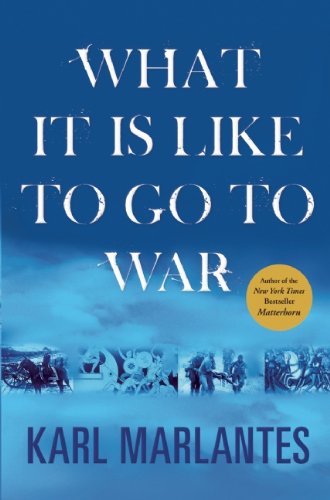
Another Marlantes classic?
Short version:I spent the dog days the earthquake and hurricane days of August reading What It Is Like To Go to War, by Karl Marlantes, and Submergence, by J.M. Ledgard. I recommend both heartily to the Battleland readership.
Long version, Part I: The title of What It Is Like To Go to War isn’t a deceptive ploy; Karl Marlantes knows what he writes. His Vietnam War novel Matterhorn was a runaway literary smash in 2010, and billed an instant classic by almost anyone that read it. (Like this guy, here). His new book is part memoir, part how-to, and part existential warrior philosophy – and all parts good. Raw, unsettling honesty pervades the work, from his forthright admission that he hunted for glory and medals when he first arrived in Vietnam, to his memories of searching out the pleasures of the flesh while away from the front lines, something that didn’t bring him any lasting fulfillment or peace of mind.
His personal recollections of combat are particularly harrowing. What It is Like to Go to War opens with a scene of Marlantes, then a young platoon leader, talking to a severely wounded soldier named Zoomer. Zoomer has been shot through the chest, and been turned on his side so his one good lung won’t fill with blood. Morphine isn’t an option, because of the possibility of him drifting off and dying in his sleep. Due to heavy fog and sustained enemy contact, the evacuation helicopters can’t get to their position, so Marlantes tells Zoomer stories to keep him sane and awake. Zoomer somehow endures, relying on the pain as he clings to life, and somehow wins his “race with death.”
And that’s just the first two pages.
For this Iraq vet though, the most powerful parts of this book occur when Marlantes returns home from war. We all know that Vietnam veterans were treated poorly, but nowadays, it’s usually referenced vaguely and abstractly, like that thing that happened at a family reunion back then that no one is supposed to talk about but it’s always circuitously referenced. Marlantes, a rational, seemingly calm man, gets spit on while on a train, simply for looking military. He’s blocked from moving through a bookstore by a group of hippies that see his dress uniform and decide to “take a stand.” (Against what, I’d like to know. High and tight haircuts seem the only reasonable explanation for such ridiculous behavior). After a year of constant war, he walks away from this situation, tired of conflict but still angry at himself for not doing something else, anything else, other than retreating.
It’s a different time now, and society has managed to separate the war from the warriors, thankfully. We still haven’t quite figured out the Homecoming aspect of warfare though, as Marlantes explores. His vision is to bring attention and awareness to the psychological and spiritual effects of combat on the individual, something that, in light of alarming suicide and PTSD numbers in the ranks of our Iraq and Afghanistan veterans, couldn’t be more timely.
Long version, Part II: In June, almost immediately after my essay asking “Where’s the Great Novel About the War on Terror?” posted at The Atlantic, a book publicist from the UK contacted IAVA, keen on sending us Submergence, by The Economist correspondent J.M. Ledgard. In classic clumsy American fashion, I’d limited the scope of my essay to Afghanistan and Iraq, completely forgetting about the “G” in “GWOT.” Much of the action in Submergence takes place in Somalia, and Ledgard’s novel served as a timely reminder that 21st century terrorism doesn’t like being quantified or contained.
Submergence’s protagonist, James More, is a MI6 spy and descendent of Thomas More, the philosopher and writer best known for Utopia. James has been kidnapped by a group of jihadists operating in the Horn of Africa, who aren’t quite sure what to make of their hostage’s “water expert” cover. In a concurrent, though separate, storyline, James’s old flame, Dr. Danielle Flinders, prepares to explore the ocean floor in a submersible. The juxtaposition between their environments is stark, as is their worldviews: for Danny, the profundity and agelessness of organisms found at the bottom of the sea validate her distance from her fellow human beings and the perceived importance of our events. For James, nothing could be more immediate and more real than the specter of death masquerading as bony Somali teenagers with guns calling themselves al-Qaeda.
It’s an odd book, though I mean that as a compliment, as it’s unlike anything else I’ve ever read, especially in the war fiction genre. There are no chapters, just short pieces that flow from Danny to James, and from the past to the present. The cerebral pontificating should be expected, given the overtones of Utopia layered in the narrative. And though it’s done with great subtlety and care, the conclusion serves as an excellent representation of these small little wars spanning our globe in current times – open-ended, messy, and uncertain of anything but that time presses on.


